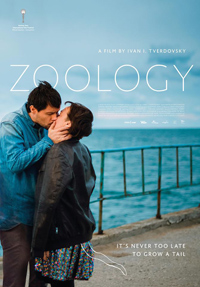Reviews
Zoology | 2016 Toronto Int. Film Festival Review
Tale of Tails: Tverdovsky’s Myopic Modern Fable Chases Its Own Tail
 Zoology. You ask, what does it mean? For the purposes of Ivan Tverdovsky’s sophomore film of the same title, it’s the study of the chemistry between a dowdy middle-aged woman and a fleshy vestigial appendance sprouting from her tail bone. Like an unexplainable, murky fairy tale, Tverdovsky doesn’t bother to explain where his heroine’s sudden growth comes from in Zoology, or why she uses it as an impetus to finally strive to lead the life she deserves, and so this becomes a muddled sketch concerning how social misfits need only embrace their uniqueness and strive to find their tribe to achieve a sense of belonging. Following up on his well-received 2014 debut Class Correction, Tverdovsky should find a more than welcoming festival circuit for his latest effort, although it often seems like the kind of material which would have been better served as a short. Still, lovers of the grotesque should find plenty to gawk at with the film’s frequent, even longing glances at the protagonist’s undulating protuberance.
Zoology. You ask, what does it mean? For the purposes of Ivan Tverdovsky’s sophomore film of the same title, it’s the study of the chemistry between a dowdy middle-aged woman and a fleshy vestigial appendance sprouting from her tail bone. Like an unexplainable, murky fairy tale, Tverdovsky doesn’t bother to explain where his heroine’s sudden growth comes from in Zoology, or why she uses it as an impetus to finally strive to lead the life she deserves, and so this becomes a muddled sketch concerning how social misfits need only embrace their uniqueness and strive to find their tribe to achieve a sense of belonging. Following up on his well-received 2014 debut Class Correction, Tverdovsky should find a more than welcoming festival circuit for his latest effort, although it often seems like the kind of material which would have been better served as a short. Still, lovers of the grotesque should find plenty to gawk at with the film’s frequent, even longing glances at the protagonist’s undulating protuberance.
Natasha (Natalia Palenkova) is a lonely, middle aged woman who lives alone with her out-of-touch mother and works in administration amongst a clutch of harpies at the local zoo of her small coastal town in Russia. But her weary existence is suddenly upended when she discovers she has a grown a tale. Alarmed, she seeks immediate medical attention, but her disinterested doctor is more concerned with how their X-ray machinery can’t properly capture the appendage because of its involuntary movements. But her frequent trips to the hospital resulted a few leaks from the medical staff and rumors of her mutation (attributed to a possessed woman) has the neighborhood gossip mongers on high alert, including her own mother. Repeated interactions with the handsome radiologist Peter (Dmitri Groshev) blossoms into unexpected romance, inspiring Natasha to embrace the attention and undergo a make-over. Soon, however, she’s questioning why Peter is actually attracted to her, and longing once more for a sense of normalcy, even though it might mean retreating into the unremarkable person she once was.
Russian folklore has a rich, fantastical flavor of the bizarre in an extensive cultural back catalogue, which has often resulted in strange cinematic offerings, often as a guise for political metaphor, the only avenue of exploration to avoid communist censorship in the past. But Natasha’s predicament doesn’t seem specific to her environment, other than she’s an office worker engaged in administrative monotony at the local zoo, her only reprieve from her cruel colleague in her chit-chats with the animals as they munch snacks together.
Thematically, this recalls a variety of similar films, particularly Anna Melikyan’s 2007 film Mermaid, about a young girl living in her own fantasy in 1970s Moscow. But early on, as Natasha is in denial about her ailment and pops prescription pills, she describes herself as asthenic, which brings to mind Kira Muratova’s 1990 masterpiece The Asthenic Syndrome, a dense work which deliberates on a whole culture succumbing to a generalized sort of hypochondria. As it turns out for Natasha, the growth ends up being the best thing ever to happen to her. Sure, locals run screaming when she goes on a bender and lets her flesh toned tail flop out of her panties in a public square for all to see, but she’s also experiencing a scandalous May-December romance with her handsome radiologist, which gives her a sort of Mrs. Robinson glow. Not surprisingly, he’s attracted to her mutation, which is evident from the beginning of their more intimate correspondences.
Her reaction to his fervor during a sexual interaction is interesting—she obviously loves his attention and affection, but is alarmed at his infatuation with her tale, the reason they know each other and the only thing saving her from fading into the sterile, bitter background of her own life.
It’s subtle psychologizing on Tverdovsky’s part, assisted mightily by a likeable performance from Natalia Palenkova (who starred in the director’s previous film), and this feels akin to the experience shared by many in the queer community who were mercilessly singled out for their extrinsic differences, and whose first sexual encounters are sometimes awkward and painful because the need to be treated as ‘normal’ and the instinct for assimilation outweighs the notion of self-worth on an individual basis (in other words, initial disappointment when sexual partners remind them of their queerness). Tverdovsky leaves Natasha’s fate in potentially violent limbo, which is perhaps the only commendable finale for such a hyperbolic fantasy.
★★½/☆☆☆☆☆
Reviewed on September 9th at the Toronto Int. Film Festival – Contemporary World Cinema Programme.
87 Minutes
Los Angeles based Nicholas Bell is IONCINEMA.com's Chief Film Critic and covers film festivals such as Sundance, Berlin, Cannes and TIFF. He is part of the critic groups on Rotten Tomatoes, The Los Angeles Film Critics Association (LAFCA), the Online Film Critics Society (OFCS) and GALECA. His top 3 for 2021: France (Bruno Dumont), Passing (Rebecca Hall) and Nightmare Alley (Guillermo Del Toro). He was a jury member at the 2019 Cleveland International Film Festival.



























